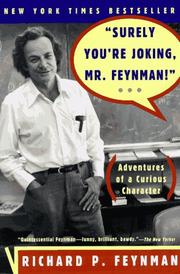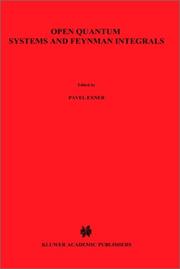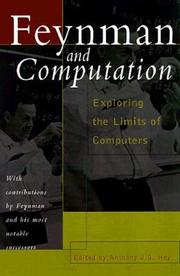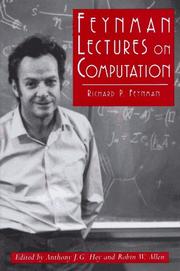| Listing 1 - 10 of 15 | << page >> |
Sort by
|

ISBN: 9780393316049 0393019217 9780393019216 0393316041 Year: 1985 Publisher: New York
Abstract | Keywords | Export | Availability | Bookmark
 Loading...
Loading...Choose an application
- Reference Manager
- EndNote
- RefWorks (Direct export to RefWorks)
Winner of the Nobel Prize for Physics in 1965, Richard Feynman was one of the world's greatest theoretical physicists, but he was also a man who fell, often jumped, into adventure. An artist, safecracker, practical joker and storyteller, Feynman's life was a series of combustible combinations made possible by his unique mixture of high intelligence, unquenchable curiosity and eternal skepticism. Over a period of years, Feynman's conversations with his friend Ralph Leighton were first taped and then set down as they appear here, little changed from their spoken form, giving a wise, funny, passionate and totally honest self-portrait of one of the greatest men of our age.
Physicists --- Science --- Feynman, Richard P. --- Feynman, Richard Phillips, --- Feĭnman, Richard P., --- Feynman, R. P. --- פינמן, ריצ'רד פיליפס. --- Physics --- Feynman, Richard P --- (Richard Phillips), 1918 --- -Physicists --- #SBIB:316.23H2 --- Sociologie van de wetenschappen --- -1945-1990 --- 53 --- -Science --- -#WSCH:AAS2 --- Natural science --- Science of science --- Sciences --- 53 Physics --- Biography --- Humor --- Feynman, Richard Phillips --- #WSCH:AAS2 --- Feynman, Richard Phillips. --- -Feynman, Richard P. --- Biography. --- Humor. --- Physiciens --- 1945-1990 --- Anecdotes --- Anecdotes. --- 53 Fysica. Natuurkunde --- Fysica. Natuurkunde

ISBN: 0679408363 0316903167 9780316903165 Year: 1992 Publisher: London Little, Brown and Company
Abstract | Keywords | Export | Availability | Bookmark
 Loading...
Loading...Choose an application
- Reference Manager
- EndNote
- RefWorks (Direct export to RefWorks)
Feynman, Richard P. --- Physics --- Physicists --- Physiciens --- Physique --- history --- biography --- Biography --- History --- Biographie --- Histoire --- Biography. --- -Physics --- -929 FEYNMAN, RICHARD --- Natural philosophy --- Philosophy, Natural --- Physical sciences --- Dynamics --- Physical scientists --- -Feynman, Richard Phillips --- 5 <092> --- #WSCH:AAS2 --- Wiskunde. Natuurwetenschappen--Biografieën --- 5 <092> Wiskunde. Natuurwetenschappen--Biografieën --- 53 <081> --- 53 <081> Physics--Verzameld werk van individuele auteurs --- Physics--Verzameld werk van individuele auteurs --- 929 FEYNMAN, RICHARD --- Feynman, Richard Phillips. --- biography. --- United States --- Physicists - United States - Biography. --- Physics - History - 20th century. --- Feynman (richard) --- Biographies

ISBN: 9027716781 9401088039 9400952074 9789027716781 Year: 1985 Publisher: Dordrecht
Abstract | Keywords | Export | Availability | Bookmark
 Loading...
Loading...Choose an application
- Reference Manager
- EndNote
- RefWorks (Direct export to RefWorks)
Quantum mechanics. Quantumfield theory --- Mathematical physics --- Open systems (Physics) --- Quantum theory --- Feynman integrals --- Quantum dynamics --- Quantum mechanics --- Quantum physics --- Physics --- Mechanics --- Thermodynamics --- Systems, Open (Physics) --- Irreversible processes --- Statistical mechanics --- Statistical physics --- Feynman diagrams --- Multiple integrals
Book
ISBN: 0387090452 3540090452 3540109706 366211044X Year: 1979 Publisher: New York
Abstract | Keywords | Export | Availability | Bookmark
 Loading...
Loading...Choose an application
- Reference Manager
- EndNote
- RefWorks (Direct export to RefWorks)
Quantum mechanics. Quantumfield theory --- Feynman diagrams --- Quantum theory --- 530.1 --- Quantum dynamics --- Quantum mechanics --- Quantum physics --- Physics --- Mechanics --- Thermodynamics --- Many-body problem --- Matrices --- Basic principles of physics --- Feynman diagrams. --- Quantum theory. --- 530.1 Basic principles of physics

ISBN: 0738200573 Year: 1999 Publisher: Reading, Mass. Perseus
Abstract | Keywords | Export | Availability | Bookmark
 Loading...
Loading...Choose an application
- Reference Manager
- EndNote
- RefWorks (Direct export to RefWorks)
Richard P. Feynman made profoundly important and prescient contributions to the physics of computing, notably with his seminal articles "There's Plenty of Room at the Bottom" and "Simulating Physics with Computers." These two provocative papers (both reprinted in this volume) anticipated, decades before their time, several breakthroughs that have since become fields of science in their own right, such as nanotechnology and the newest, perhaps most exciting area of physics and computer science, quantum computing." "Both a tribute to Feynman and a new exploration of the limits of computers by some of today's most influential scientists, Feynman and Computation continues the pioneering work started by Feynman and published by him in his own Lectures on Computation. This new computation volume consists of both original chapters and reprints of classic papers by leaders in the field. Feynman and Computation will generate great interest from the scientific community and provide essential background for further work in this field.
Quantum mechanics. Quantumfield theory --- Physics --- Mathematical physics --- Computers. --- Quantum computers. --- Informatique quantique. --- Physique --- Physique mathématique --- Ordinateurs. --- Data processing. --- Computer simulation --- Informatique --- Simulation par ordinateur --- Feynman, Richard P. --- Feynman, Richard Phillips --- Informatique. --- Simulation par ordinateur. --- Computer simulation. --- Physics. --- Physique. --- Feynman, Richard Phillips,

ISBN: 0201489910 9780738202969 9780201489910 0738202967 Year: 1996 Publisher: Reading, Mass. Perseus
Abstract | Keywords | Export | Availability | Bookmark
 Loading...
Loading...Choose an application
- Reference Manager
- EndNote
- RefWorks (Direct export to RefWorks)
From 1983 to 1986, the legendary physicist and teacher Richard Feynman gave a course at Caltech called "Potentialities and Limitations of Computing Machines."Although the lectures are over ten years old, most of the material is timeless and presents a "Feynmanesque" overview of many standard and some not-so-standard topics in computer science. These include computability, Turing machines (or as Feynman said, "Mr. Turing's machines"), information theory, Shannon's Theorem, reversible computation, the thermodynamics of computation, the quantum limits to computation, and the physics of VLSI devices. Taken together, these lectures represent a unique exploration of the fundamental limitations of digital computers.Feynman's philosophy of learning and discovery comes through strongly in these lectures. He constantly points out the benefits of playing around with concepts and working out solutions to problems on your own-before looking at the back of the book for the answers. As Feynman says in the lectures: "If you keep proving stuff that others have done, getting confidence, increasing complexities of your solutions-for the fun of it-then one day you'll turn around and discovers that nobody actually did that one ! And that's the way to become a computer scientist."
Electronic data processing --- Informatique --- Feynman, Richard P. --- Feynman, Richard Phillips --- Electronic data processing. --- Quantum mechanics. Quantumfield theory --- ADP (Data processing) --- Automatic data processing --- Data processing --- EDP (Data processing) --- IDP (Data processing) --- Integrated data processing --- Computers --- Office practice --- Automation --- Logic, Symbolic and mathematical. --- Informatique. --- Logique mathématique. --- Feynman, Richard Phillips,
Book
ISBN: 038790137X 354090137X 1468493671 9780387901374 Year: 1975 Volume: 16 Publisher: New York, N.Y. Springer
Abstract | Keywords | Export | Availability | Bookmark
 Loading...
Loading...Choose an application
- Reference Manager
- EndNote
- RefWorks (Direct export to RefWorks)
Algebraic topology --- Discrete mathematics --- Graph theory --- Electric networks --- 515.14 --- Feynman integrals --- Picard-Lefschetz theory --- Lefschetz theorem, Picard --- -Lefschetz theory, Picard --- -Picard-Lefschetz theorem --- Geometry, Algebraic --- Graphs, Theory of --- Theory of graphs --- Combinatorial analysis --- Topology --- Feynman diagrams --- Multiple integrals --- Network theory --- Networks, Electric --- Electric circuits --- Electric lines --- Electric power distribution --- System analysis --- Extremal problems --- Algebraic topology. --- Electric networks. --- Feynman integrals. --- Graph theory. --- Picard-Lefschetz theory. --- 515.14 Algebraic topology --- Feynman, Intégrales de --- Réseaux électriques (circuits) --- Graphes, Théorie des --- Topologie algébrique --- Feynman, Intégrales de --- Graphes, Théorie des --- Réseaux électriques (circuits) --- Topologie algébrique

ISBN: 0750309504 0750308648 9780750309509 9780750308649 Year: 2004 Publisher: New York, N.Y. Taylor & Francis
Abstract | Keywords | Export | Availability | Bookmark
 Loading...
Loading...Choose an application
- Reference Manager
- EndNote
- RefWorks (Direct export to RefWorks)
530.19 --- 530.19 Fundamental functions in general. Potential. Gradient. Intensity. Capacity etc. --- Fundamental functions in general. Potential. Gradient. Intensity. Capacity etc. --- Feynman, Diagrammes de --- Feynman diagrams. --- Gauge fields (Physics). --- Particles (Nuclear physics). --- Quantum electrodynamics. --- Weak interactions (Nuclear physics). --- Gauge fields (Physics) --- Particles (Nuclear physics) --- Weak interactions (Nuclear physics) --- Quantum electrodynamics --- Feynman diagrams --- Champs de jauge (Physique) --- Particules (Physique nucléaire) --- Electrodynamique quantique --- Mathematical physics --- Elementary particles
Book
ISBN: 0070409544 Year: 1976 Publisher: New York
Abstract | Keywords | Export | Availability | Bookmark
 Loading...
Loading...Choose an application
- Reference Manager
- EndNote
- RefWorks (Direct export to RefWorks)
Quantum mechanics. Quantumfield theory --- Mathematical physics --- Feynman diagrams --- Many-body problem --- #WSCH:AAS2 --- 530.19 --- n-body problem --- Problem of many bodies --- Problem of n-bodies --- Mechanics, Analytic --- Matrices --- Quantum theory --- Fundamental functions in general. Potential. Gradient. Intensity. Capacity etc. --- Feynman diagrams. --- Many-body problem. --- 530.19 Fundamental functions in general. Potential. Gradient. Intensity. Capacity etc. --- Problème des N corps --- Feynman, Diagrammes de --- Fundamental functions in general. Potential. Gradient. Intensity. Capacity etc --- Problème à N corps --- Problème à N corps. --- Feynman, Diagrammes de. --- Problème à N corps.
Book
ISBN: 3540077855 0387077855 354038250X 9783540077855 9780387077857 Year: 1976 Volume: 523 Publisher: Berlin
Abstract | Keywords | Export | Availability | Bookmark
 Loading...
Loading...Choose an application
- Reference Manager
- EndNote
- RefWorks (Direct export to RefWorks)
Statistical physics --- Quantum mechanics. Quantumfield theory --- Mathematical physics --- Measure theory. Mathematical integration --- 51-7 --- Mathematical studies and methods in other sciences. Scientific mathematics. Actuarial mathematics. Biometrics. Econometrics etc. --- Feynman integrals. --- 51-7 Mathematical studies and methods in other sciences. Scientific mathematics. Actuarial mathematics. Biometrics. Econometrics etc. --- Feynman, Intégrales de
| Listing 1 - 10 of 15 | << page >> |
Sort by
|

 Search
Search Feedback
Feedback About UniCat
About UniCat  Help
Help News
News